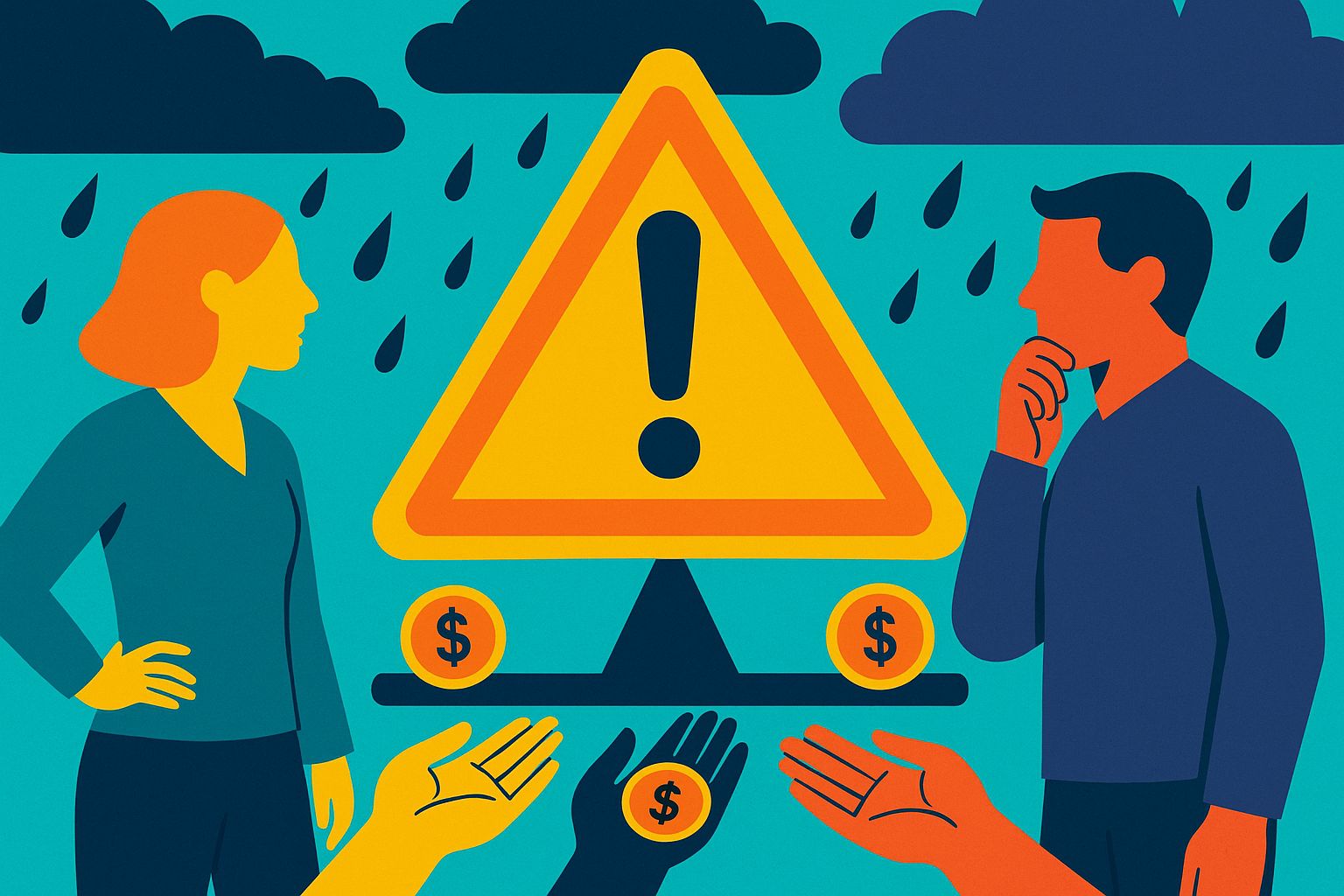Navigating the Crowdfunding Minefield
Crowdfunding has revolutionized the way entrepreneurs transform ideas into reality, tapping into the collective enthusiasm of backers worldwide. Yet, beneath the surface of this democratic funding model lies a complex terrain of risks that can derail even the most promising campaigns. From financial miscalculations to reputation-damaging missteps, founders who overlook these hazards may find their dreams slipping through the cracks. Understanding the landscape of crowdfunding risks every founder should know is not merely prudent—it’s essential for ensuring that your campaign doesn’t become a cautionary tale. In this deep dive, we’ll explore the most critical challenges that lurk behind the allure of crowdfunding, and equip you with strategies to anticipate, mitigate, and ultimately transform these risks into pathways for success.
The All-or-Nothing Gamble
One of the most celebrated features of popular crowdfunding platforms is the all-or-nothing funding model: if you don’t reach your target, you receive nothing. This mechanism protects backers from half-baked projects, but it also places immense pressure on founders. Setting a goal that’s too lofty can leave you high and dry, whereas an artificially low target may not cover your project’s real costs. Striking the right balance demands meticulous budgeting and market forecasting. Founders must conduct rigorous research into manufacturing expenses, platform fees, shipping costs, and contingency reserves before committing to a funding goal. Underestimating the financial scope can leave you saddled with unfinished products and disappointed supporters, undermining credibility and firing backers’ trust faster than you can say “pledge.”
Financial Miscalculations and Budget Overruns
Even fully funded campaigns can founder if budgets spiral out of control. Many founders focus so intently on hitting their target that they forget to build in buffers for unexpected expenses. Currency fluctuations, customs duties, and last-minute tooling adjustments can send costs soaring. Meanwhile, payment processing fees—often around 3–5%—and platform commissions—ranging from 5–10%—chip further away at your net proceeds. Founders should adopt a conservative approach to budgeting, incorporating a contingency buffer of at least 15–20% to absorb unforeseen costs. Detailed line-item budgets, quotes from multiple suppliers, and professional financial advice can help you anticipate hidden expenses and avoid the dreaded scenario of running out of funds mid-production.
Intellectual Property Exposures
When you launch a public campaign, you’re effectively broadcasting your innovation to the world. Without proper safeguards, your idea may be copied or “inspired” by competitors who watch your progress unfold on the crowdfunding stage. Filing for patents or trademarks before your campaign goes live can protect your core intellectual property, but these processes can be time-consuming and costly. In some cases, seeking provisional patents or leveraging non-disclosure agreements with key partners offers a speedier route to protection. Founders must also be mindful of what technical details they share: too much transparency can aid copycats, while too little may undermine backer confidence. Striking the right balance between openness and secrecy is a delicate art that every crowdfunding founder must master.
Logistical and Fulfillment Nightmares
Transitioning from campaign success to product delivery often proves more treacherous than the fundraising itself. Coordinating manufacturing, quality control, packaging, and shipping at scale introduces countless moving parts. Manufacturers may miss deadlines, quality issues can necessitate rework, and international shipping may run afoul of customs inspections. Managing these complexities requires robust project management and, ideally, partnerships with experienced fulfillment centers. Outsourcing logistics to third-party providers can streamline operations, but it also reduces your margin and introduces another layer of oversight. Proactive communication with backers—sharing regular updates and candid timelines—helps manage expectations and preserve goodwill, even when delays occur.
Reputation and Trust Risks
In crowdfunding, your reputation is your currency. Backers pledge based on trust in your competence, transparency, and integrity. Any breach—whether a broken promise, delayed delivery, or substandard product—can trigger a wave of negative reviews, social media backlash, and refund requests. Unlike traditional commerce, crowdfunding backers aren’t just customers; they’re early adopters and ambassadors. Disillusioned backers can become vocal detractors, damaging brand perception and hindering future campaigns. Founders must treat communication as a central pillar of campaign strategy—issuing timely updates, addressing setbacks openly, and providing tangible evidence of progress. Demonstrating accountability turns potential trust breaches into opportunities to reinforce your commitment and deepen backer loyalty.
Legal and Regulatory Hurdles
Crowdfunding campaigns are subject to a web of legal requirements that vary by jurisdiction and funding model. Reward-based campaigns must comply with consumer protection laws, truth-in-advertising standards, and taxation rules. Equity crowdfunding adds another layer of complexity, invoking securities regulations, investor accreditation criteria, and detailed financial disclosures. Noncompliance can spark investigations, forced refunds, fines, or even litigation. Navigating these waters often requires guidance from experienced legal counsel and accountants. Founders should draft clear terms and conditions, privacy policies, and risk disclosures, ensuring backers understand potential pitfalls. Proactively addressing regulatory obligations not only shields you from legal jeopardy but also signals professionalism and credibility to prospective supporters.
Security Vulnerabilities and Fraud Threats
With large sums of money flowing through crowdfunding platforms, founders must remain vigilant against cyber threats and fraud. Phishing attacks, account takeovers, and payment interceptions endanger both your campaign funds and backers’ personal data. Implementing robust security measures—complex passwords, two-factor authentication, secure payment gateways, and encrypted communications—is nonnegotiable. You should also vet any third-party service providers carefully, ensuring they adhere to industry-standard security practices. Regular security audits and swift responses to suspected breaches help maintain a safe environment for you and your backers, preserving trust and protecting sensitive information.
Market Overexposure and Competitive Pressures
A successful crowdfunding campaign inevitably attracts attention—sometimes from competitors eager to capitalize on your concept. Rapidly rising campaigns can spark copycat ventures that undercut your offering with lower prices or incremental tweaks. Market overexposure may also heat customer expectations prematurely, making it harder to sustain momentum after the campaign closes. Founders can mitigate these risks by leveraging campaign exclusivity—offering limited-edition rewards, early-bird pricing windows, or stretch-goal perks available only to backers. Building a close-knit backer community through private updates, invite-only groups, or in-person events fosters loyalty that transcends mere product features, insulating your brand from external competitive pressures.
Backer Expectation Management
Crowdfunding backers come with high hopes and varied motivations: some seek the thrill of early access, others crave exclusive experiences, and still more are driven by a passion for your mission. Managing these diverse expectations is a formidable challenge. Failing to deliver agreed-upon perks—or delaying them without explanation—can sow dissatisfaction. Conversely, overpromising in exchange tiers you can’t realistically fulfill tarnishes your credibility. The key lies in setting clear, achievable milestones and communicating proactively when timelines shift. Personalizing updates—acknowledging top backers, sharing behind-the-scenes challenges, and celebrating small wins—nurtures a sense of shared journey that bolsters patience and keeps enthusiasm alive even in the face of setbacks.
Burnout and Founders’ Well-Being
Behind every crowdfunding success story stands a dedicated founder working around the clock. The relentless pace of campaign promotion, customer inquiries, product development, and fulfillment can lead to burnout, which in turn compromises decision-making and harms team dynamics. Founders must prioritize self-care and sustainable work habits, delegating tasks and setting realistic boundaries. Building a reliable support network—whether through co-founders, mentors, or professional service providers—eases the burden and ensures no single individual bears the campaign’s weight alone. By safeguarding mental and physical well-being, you maintain the clarity and energy necessary to steer your project through turbulent waters.
Mitigating Crowdfunding Risks Proactively
Acknowledging risks is only the first step; effective founders implement proactive strategies to minimize exposure. Thorough market research and feasibility studies lay a foundation for realistic funding goals and demand projections. Early engagement with legal and financial advisors ensures compliance from day one. Quality control protocols—such as pilot production runs and third-party inspections—catch defects before they reach backers. Leveraging project management tools and collaborative platforms streamlines communication across your team and with external vendors. Finally, building rapport with backers through transparent storytelling and responsive customer service transforms potential detractors into advocates, transforming risks into community-driven safeguards.
Building a Resilient Campaign Strategy
Resilience in crowdfunding means preparing for the unexpected and adapting swiftly when challenges arise. Scenario planning—mapping out best-case, worst-case, and most-likely outcomes—equips you to pivot when market conditions shift or supply chains hiccup. Diversifying funding channels, such as combining reward-based campaigns with pre-order systems or private investor rounds, reduces reliance on a single platform. Cultivating relationships with industry influencers, press contacts, and strategic partners enhances your ability to amplify positive momentum or weather negative press. By integrating flexibility and contingency planning into every stage of your campaign, you construct a robust strategy that weathers storms and emerges stronger on the other side.
Turning Hazards into Highways
Crowdfunding stands as a beacon of opportunity for innovators everywhere, democratizing access to capital and fostering vibrant communities of passionate backers. Yet this promise comes hand-in-hand with a host of risks that can derail even the most brilliant ideas. From the financial tightrope of all-or-nothing models to the reputational perils of unfulfilled promises, founders face a complex gauntlet that demands vigilance, planning, and unshakable integrity. By understanding the full spectrum of crowdfunding risks every founder should know—and by adopting proactive mitigation strategies—you transform potential hazards into strategic advantages. In doing so, you not only safeguard your campaign but also elevate the crowdfunding ecosystem, inspiring confidence in backers and paving the way for your next game-changing venture.




